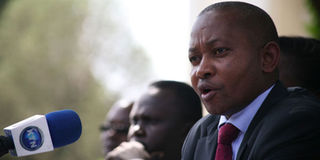Lawyers want crimes division speeded up

PHOTO | FILE Law Society of Kenya chairman Eric Mutua. The LSK chair said the formation of the division, which has been talked about for two years, is long overdue.
What you need to know:
- Attorney-General Githu Muigai and JSC Commissioner Samuel Kobia said on the sidelines of the Assemblies of State Parties meeting in The Hague last month, that efforts were in place to establish the ICD to handle future crimes.
- Director of International Law at the German Foreign Office Dr Pascal Hector urged Kenyan leaders to work with other African countries to make the judicial system better to promote complementarity.
Lawyers want the government to speed up formation of the International Crimes Division of the High Court to try middle-level perpetrators of the 2007/8 post-election violence and cross-border offences.
Law Society of Kenya chair Eric Mutua said the formation of the division, which has been talked about for two years, is long overdue.
“We call on the sub-committee formed to work on its establishment to finalise preparations,” Mr Mutua told the Sunday Nation.
The LSK chair said formation of the ICD is crucial as it will support the prosecution of middle-level perpetrators as the International Criminal Court deals with key suspects.
“A lot of crime is also being committed at transnational level. We also need to build capacity to prosecute and try the cases,” Mr Mutua said.
He regretted that the sub-committee formed to establish the division, where LSK is also represented, has not made “much progress”, and is still grappling with issues including having an independent prosecutor and training judges to head the division.
“We support the division, not necessarily because of the post- election violence perpetrators but to have the capacity to deal with cross-border and other international crimes such as piracy,” Mr Mutua said.
But he regretted that the recent stalemate at the Judiciary could delay the formation of the ICD.
“Although JSC is operational, there’s a cloud over it as the necessary legitimacy for the commissioners to deal with issues may be brought into dispute,” Mr Mutua said.
Kenyan authorities had promised to establish the ICD by the end of the year to try those allegedly involved in the 2007/08 post-election violence, even as cases against President Uhuru Kenyatta, his deputy William Ruto and radio presenter, Joshua Sang, continue.
Attorney-General Githu Muigai and JSC Commissioner Samuel Kobia said on the sidelines of the Assemblies of State Parties meeting in The Hague last month, that efforts were in place to establish the ICD to handle future crimes.
Dr Kobia believes the ICC should support Kenya in building the national rule of law by creating the ICD. “It is what will determine its success.”
He added that Kenya is fully prepared to launch the ICD by January 2014. “We have visited Uganda, Rwanda, Cambodia and The Hague to study their local divisions.”
But Botswana Attorney-General Athalia Molokomme feels Kenya is not ready to set up a local international criminal division.
“Generally, in Africa our legal and institutional structures are not well-developed to meet the set standards by the international court, and Kenya is no exception,” she said.
She cited the example of the African Union (AU) court that was to take up criminal cases, but which has taken forever to commence operations.
Executive Director of the International Centre for Transitional Justice (ICTJ) Kenya Njonjo Mue also disagreed with Mr Muigai’s sentiments.
UNWILLING, UNPREPARED
“How prepared are we to set up a local ICD when our witness protection unit does not work as it should? Its budget is insufficient and has currently been reduced by 15 per cent” he said. “What magic will we need as Kenyan leaders to generate the will to be fair in the ICD, when we have failed several times before?”
Mr Mue thinks the ICD is being set up with the possibility of bringing the Kenyan cases at the ICC back home.
Director of International Law at the German Foreign Office Dr Pascal Hector urged Kenyan leaders to work with other African countries to make the judicial system better to promote complementarity.
Dr Hector, whose office is funding the ICD, said the division is crucial because it will help deal with middle-level perpetrators of international crimes. “Generally, I have spotted numerous deficits in enforcing the law in the region. Setting up a local division alone is not enough; it needs to be supported by putting into practice the set laws.”
Prof Alex Whiting, Harvard Law School, said that Kenya needs to have the political will, commitment and togetherness to set up a local tribunal.





